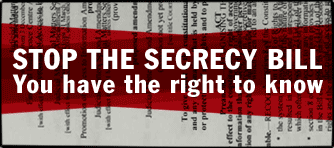 The Department of State Security has rejected proposals to amend the Protection of State Information Bill (commonly known as the secrecy bill) to protect the right of ordinary people to access information from the government, a right currently enshrined in the Constitution and practically realised in the Promotion of Access to Information Act (PAIA).
The Department of State Security has rejected proposals to amend the Protection of State Information Bill (commonly known as the secrecy bill) to protect the right of ordinary people to access information from the government, a right currently enshrined in the Constitution and practically realised in the Promotion of Access to Information Act (PAIA).
Access to information advocates, including SAHA, have been highly critical of clause 1(4) of the bill, which renders the right to information under PAIA subordinate to the restrictions of access to classified information contained in the bill.
Responding to these criticisms on 6 June 2012 before the National Council of Provinces Ad Hoc Committee considering the bill, Acting Director General of the department, Dennis Dlomo, commented that PAIA would continue to deal with matters of access, even for classified information.
According to minutes of the meeting prepared by the Parliamentary Monitoring Group, Dlomo stated that if information "must be given [under PAIA], yet the information was classified, declassification steps must follow. If information fell into the ‘may be given' category [under PAIA], the official had a discretion and that information may or may not end up being given. If it feel into the ‘must not be given' category [under PAIA] then it would not be given, and the appeal (including the court) procedures would follow." Dlomo insisted "there should not be any point at which there should be any clash of interpretation between PAIA and the bill."
Dlomo's statement reflects a misunderstanding of the operation of clause 1(4) of the bill. If the clause is enacted it will not matter whether classified information must, may or must not be given according to the criteria in PAIA. Instead, access to classified information will be governed by the secrecy bill, which would allow the government to withhold classified information from disclosure (except in limited circumstances where the public interest override test is satisfied) solely on the basis of its classification.
It appears that subsequent to that meeting the correct legal position was explained to Dlomo, because when he appeared before the committee again on 12 June 2012, he was singing a different tune.
At that meeting, Dlomo instead suggested that information related to national security was insufficiently protected by PAIA. According to minutes of the meeting prepared by the Parliamentary Monitoring Group, Dlomo suggested that section 41 of PAIA (which allows access to information to be denied on the basis it could reasonably be expected to prejudice the defence, security or international relations of South Africa) afforded no protection to classified information outside the ambit of that section "notwithstanding the need for the protection of such information." Such information, he suggested, would now be protected under the bill.
Dlomo is therefore now admitting that information that would be required to be released under PAIA may be kept secret under the bill.
Claiming PAIA is inadequate in protecting information related to national security is a new tact for the department; this is the first time the department has raised the allegation, despite the bill being the subject of heated debate for almost 2 years.
The failure to raise this position earlier suggests it represents a desperate attempt to justify the bill, rather than any real need to protect national security. Indeed, despite PAIA being enacted over a decade ago, SAHA is not aware of any instance in which classified information has been released under PAIA to the detriment of national security, nor did Dlomo offer any such example in his presentation.
At this point it is unclear whether the Ad Hoc Committee will accept Dlomo's argument or whether they will recommend changes to the bill to ensure the prominence of PAIA is maintained.





 The Department of State Security has rejected proposals to amend the Protection of State Information Bill (commonly known as the secrecy bill) to protect the right of ordinary people to access information from the government, a right currently enshrined in the Constitution and practically realised in the Promotion of Access to Information Act (PAIA).
The Department of State Security has rejected proposals to amend the Protection of State Information Bill (commonly known as the secrecy bill) to protect the right of ordinary people to access information from the government, a right currently enshrined in the Constitution and practically realised in the Promotion of Access to Information Act (PAIA).